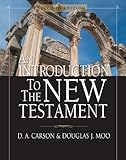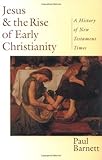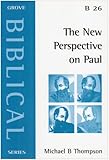Due to the nature of the topic, there is a lot of reading. The topics range from historical background to critical method. Consider these reading tips as you wade into this material.

1. Darrell Bock, Studying the Historical Jesus: A Guide to Sources and Methods (Grand Rapids: Baker, 2002).
This is a great reference book. The first half addresses background issues such as a historical outline, a religious overview, and a look at the various social groups within the first century. The second half of the book briefly addresses the various types of Gospel criticism. Here Bock gives a concise definition and evaluates both the benefits and drawbacks for each criticism.
I have referred to this book regularly throughout my masters program, doctoral program, and now regularly as I write. I would highly recommend it to your bookcase.

2. D. A. Carson and Douglass Moo, An Introduction to the New Testament (Grand Rapids: Zondervan, 2005).
I would recommend that students have a NT Introduction in their library. And this is a good one to consider. Carson and Moo address the general and specific problems of each New Testament book. They discuss general issues such as who wrote each book and when it was written, but also particular problems such as the relationship of the Synoptic Gospels or Paul’s relationship to the law. You’ll refer to this book regularly throughout your studies.
Donald Guthrie’s Introduction, a suggested text, is probably more thorough, but significantly longer. Both Carson/Moo and Guthrie are conservative in their perspective. Bart Ehrman’s Introduction, another suggested text, gives a liberal perspective. Kümmel’s Introduction, not on the syllabus, is another good introduction from a liberal perspective.

3. Paul Barnett, Jesus and the Rise of Early Christianity: A History of New Testament Times (Downer’s Grove, IL: InterVarsity, 1999).
Barnett provides more of a historical overview of the period of the New Testament. He focuses on the history of the church within the apostolic period, particularly the missionary movement of Paul and other members of the apostolic church. This is an excellent book focusing on a short period of time.
F. F. Bruce wrote a good historical overview as well. Unlike Barnett, Bruce covers the Jewish history from the Babylonian exile, which plays a significant role in the lives of the Jews during the time of Jesus.
 4. Bruce W. Longenecker, The Lost Letters of Pergamum: A Story from the New Testament World (Grand Rapids: Baker, 2003).
4. Bruce W. Longenecker, The Lost Letters of Pergamum: A Story from the New Testament World (Grand Rapids: Baker, 2003).The Lost Letters of Pergamum is a fictional depiction of letters between Luke, the Evangelist, and man named Antipas. Through these letters you can catch a glimpse at some of the social make-up of the first century culture. Longenecker describes issues such as honor and shame, table fellowship, wealth, slavery, and martyrdom through these letters.
As a result of the dialogue with Luke, Antipas becomes a part of a Christian community, which gives a picture of how these early Christian communities most likely addressed the surrounding culture. It’s a fun read.
 5. Michael B. Thompson, The New Perspective on Paul (Cambridge: Grove Books, 2010).
5. Michael B. Thompson, The New Perspective on Paul (Cambridge: Grove Books, 2010).This small volume is about 30 pages in length. Thompson does a great job discussing the various proponents of the New Perspective and how they differ in degree. He discusses the historical implications as well as the theological implications. This is a handy volume to help guide a new student into this issue. Due to its length, you might be able to read it in a single setting in the library.
There are several other resources that could be added to the list, but this is where we draw the line.

